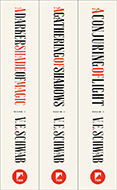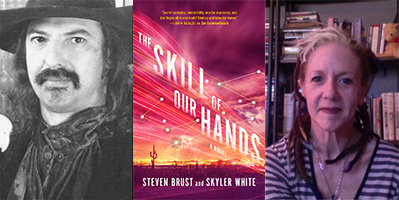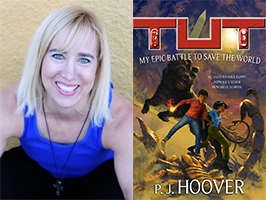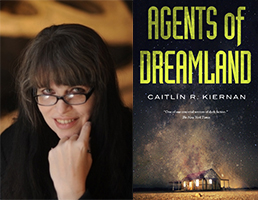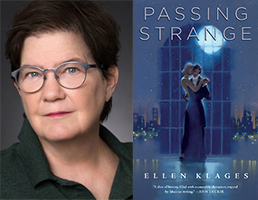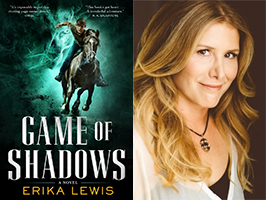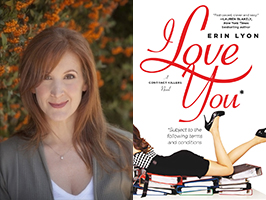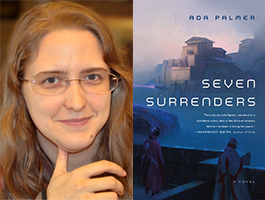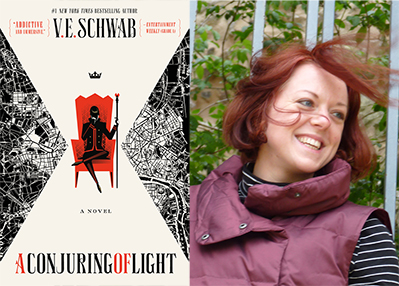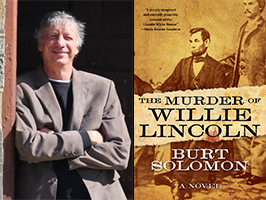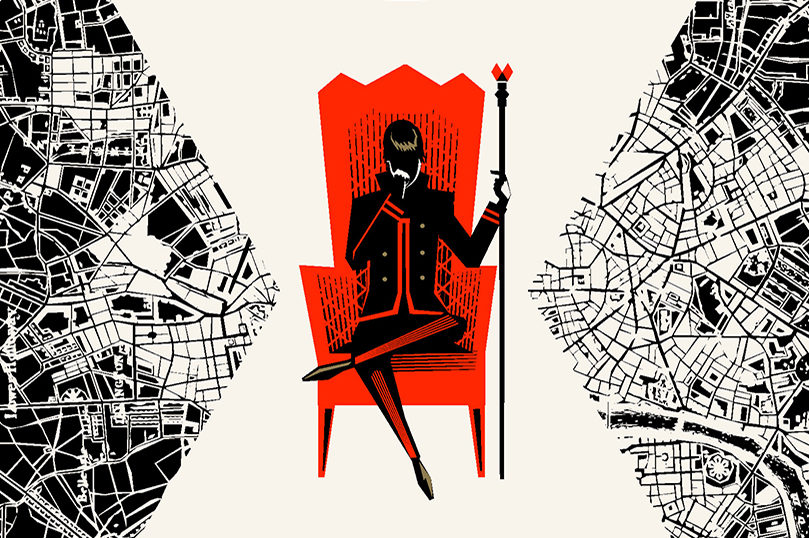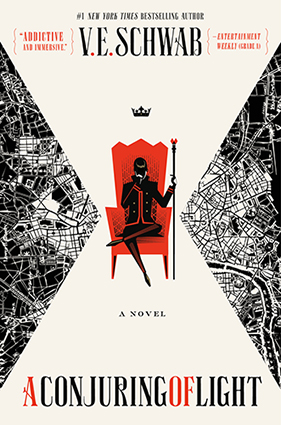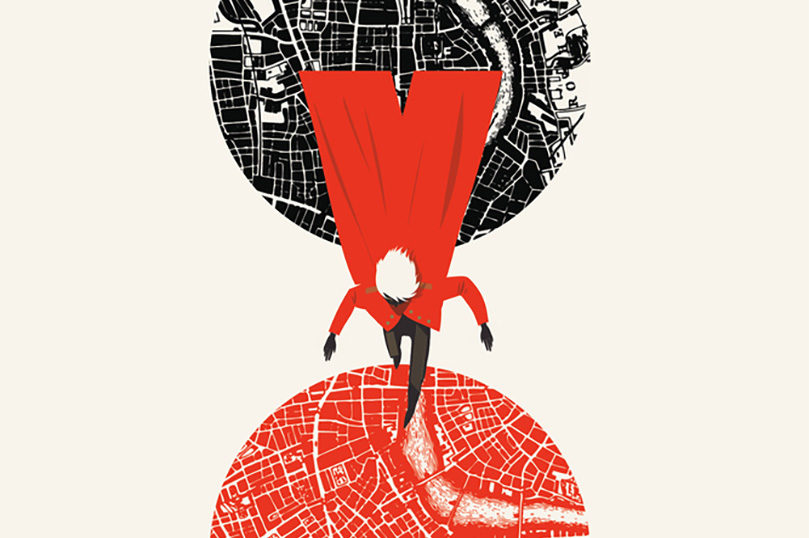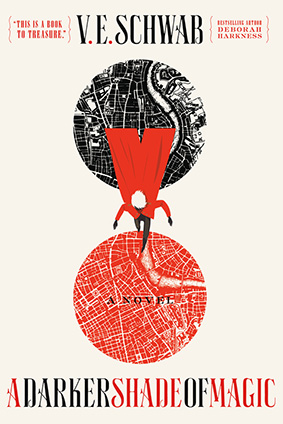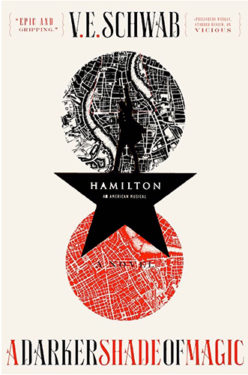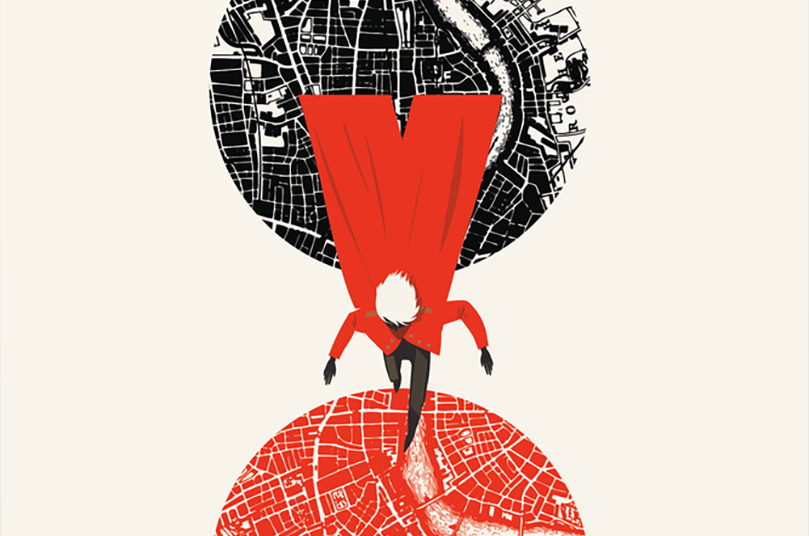opens in a new window opens in a new window
opens in a new window opens in a new window
opens in a new window opens in a new window
opens in a new window opens in a new window
opens in a new window opens in a new window
opens in a new window
opens in a new window Welcome back to opens in a new windowFantasy Firsts. Our program continues today with an extended excerpt from A Darker Shade of Magic, V.E. Schwab’s daring adventure across multiple Londons. The next book in this series, opens in a new windowA Conjuring of Light, will become available February 21st.
Welcome back to opens in a new windowFantasy Firsts. Our program continues today with an extended excerpt from A Darker Shade of Magic, V.E. Schwab’s daring adventure across multiple Londons. The next book in this series, opens in a new windowA Conjuring of Light, will become available February 21st.
Kell is one of the last Travelers—magicians with a rare, coveted ability to travel between parallel universes, connected by one magical city.
There’s Grey London, dirty and boring, without any magic, and with one mad king-George III. Red London, where life and magic are revered-and where Kell was raised alongside Rhys Maresh, the rougish heir to a flourishing empire. White London-a place where people fight to control magic, and the magic fights back, draining the city to its very bones. And once upon a time, there was Black London. But no one speaks of that now.
Officially, Kell is the Red Traveler, ambassador of the Maresh empire, carrying the monthly correspondences between the royals of each London. Unofficially, Kell is a smuggler, servicing people willing to pay for even the smallest glimpses of a world they’ll never see. It’s a defiant hobby with dangerous consequences, which Kell is now seeing firsthand.
Fleeing into Grey London, Kell runs into Delilah Bard, a cut-purse with lofty aspirations. She first robs him, then saves him from a deadly enemy, and finally forces Kell to spirit her to another world for a proper adventure.
Now perilous magic is afoot, and treachery lurks at every turn. To save all of the worlds, they’ll first need to stay alive.
ONE: THE TRAVELER
I
Kell wore a very peculiar coat.
It had neither one side, which would be conventional, nor two, which would be unexpected, but several, which was, of course, impossible.
The first thing he did whenever he stepped out of one London and into another was take off the coat and turn it inside out once or twice (or even three times) until he found the side he needed. Not all of them were fashionable, but they each served a purpose. There were ones that blended in and ones that stood out, and one that served no purpose but of which he was just particularly fond.
So when Kell passed through the palace wall and into the anteroom, he took a moment to steady himself—it took its toll, moving between worlds—and then shrugged out of his red, high-collared coat and turned it inside out from right to left so that it became a simple black jacket. Well, a simple black jacket elegantly lined with silver thread and adorned with two gleaming columns of silver buttons. Just because he adopted a more modest palette when he was abroad (wishing neither to offend the local royalty nor to draw attention) didn’t mean he had to sacrifice style.
Oh, kings, thought Kell as he fastened the buttons on the coat. He was starting to think like Rhy.
On the wall behind him, he could just make out the ghosted symbol made by his passage. Like a footprint in sand, already fading.
He’d never bothered to mark the door from this side, simply because he never went back this way. Windsor’s distance from London was terribly inconvenient considering the fact that, when traveling between worlds, Kell could only move between a place in one and the same exact place in another. Which was a problem because there was no Windsor Castle a day’s journey from Red London. In fact, Kell had just come through the stone wall of a courtyard belonging to a wealthy gentleman in a town called Disan. Disan was, on the whole, a very pleasant place.
Windsor was not.
Impressive, to be sure. But not pleasant.
A marble counter ran against the wall, and on it a basin of water waited for him, as it always did. He rinsed his bloody hand, as well as the silver crown he’d used for passage, then slipped the cord it hung on over his head, and tucked the coin back beneath his collar. In the hall beyond, he could hear the shuffle of feet, the low murmur of servants and guards. He’d chosen the anteroom specifically to avoid them. He knew very well how little the Prince Regent liked him being here, and the last thing Kell wanted was an audience, a cluster of ears and eyes and mouths reporting the details of his visit back to the throne.
Above the counter and the basin hung a mirror in a gilded frame, and Kell checked his reflection quickly—his hair, a reddish brown, swept down across one eye, and he did not fix it, though he did take a moment to smooth the shoulders of his coat—before passing through a set of doors to meet his host.
The room was stiflingly warm—the windows latched despite what looked like a lovely October day—and a fire raged oppressively in the hearth.
George III sat beside it, a robe dwarfing his withered frame and a tea tray untouched before his knees. When Kell came in, the king gripped the edges of his chair.
“Who’s there?” he called out without turning. “Robbers? Ghosts?”
“I don’t believe ghosts would answer, Your Majesty,” said Kell, announcing himself.
The ailing king broke into a rotting grin. “Master Kell,” he said. “You’ve kept me waiting.”
“No more than a month,” he said, stepping forward.
King George squinted his blind eyes. “It’s been longer, I’m sure.”
“I promise, it hasn’t.”
“Maybe not for you,” said the king. “But time isn’t the same for the mad and the blind.”
Kell smiled. The king was in good form today. It wasn’t always so. He was never sure what state he’d find his majesty in. Perhaps it had seemed like more than a month because the last time Kell visited, the king had been in one of his moods, and Kell had barely been able to calm his fraying nerves long enough to deliver his message.
“Maybe it’s the year that has changed,” continued the king, “and not the month.”
“Ah, but the year is the same.”
“And what year is that?”
Kell’s brow furrowed. “Eighteen nineteen,” he said.
A cloud passed across King George’s face, and then he simply shook his head and said, “Time,” as if that one word could be to blame for everything. “Sit, sit,” he added, gesturing at the room. “There must be another chair here somewhere.”
There wasn’t. The room was shockingly sparse, and Kell was certain the doors in the hall were locked and unlocked from without, not within.
The king held out a gnarled hand. They’d taken away his rings, to keep him from hurting himself, and his nails were cut to nothing.
“My letter,” he said, and for an instant Kell saw a glimmer of George as he once was. Regal.
Kell patted the pockets of his coat and realized he’d forgotten to take the notes out before changing. He shrugged out of the jacket and returned it for a moment to its red self, digging through its folds until he found the envelope. When he pressed it into the king’s hand, the latter fondled it and caressed the wax seal—the red throne’s emblem, a chalice with a rising sun—then brought the paper to his nose and inhaled.
“Roses,” he said wistfully.
He meant the magic. Kell never noticed the faint aromatic scent of Red London clinging to his clothes, but whenever he traveled, someone invariably told him that he smelled like freshly cut flowers. Some said tulips. Others stargazers. Chrysanthemums. Peonies. To the king of England, it was always roses. Kell was glad to know it was a pleasant scent, even if he couldn’t smell it. He could smell Grey London (smoke) and White London (blood), but to him, Red London simply smelled like home.
“Open it for me,” instructed the king. “But don’t mar the seal.”
Kell did as he was told, and withdrew the contents. For once, he was grateful the king could no longer see, so he could not know how brief the letter was. Three short lines. A courtesy paid to an ailing figurehead, but nothing more.
“It’s from my queen,” explained Kell.
The king nodded. “Go on,” he commanded, affecting a stately countenance that warred with his fragile form and his faltering voice. “Go on.”
Kell swallowed. “‘Greetings to his majesty, King George III,’” he read, “‘from a neighboring throne.’”
The queen did not refer to it as the red throne, or send greetings from Red London (even though the city was in fact quite crimson, thanks to the rich, pervasive light of the river), because she did not think of it that way. To her, and to everyone else who inhabited only one London, there was little need to differentiate among them. When the rulers of one conversed with those of another, they simply called them others, or neighbors, or on occasion (and particularly in regard to White London) less flattering terms.
Only those few who could move among the Londons needed a way to keep them straight. And so Kell—inspired by the lost city known to all as Black London—had given each remaining capital a color.
Grey for the magic-less city.
Red, for the healthy empire.
White, for the starving world.
In truth, the cities themselves bore little resemblance to one another (and the countries around and beyond bore even less). The fact they were all called London was its own mystery, though the prevailing theory was that one of the cities had taken the name long ago, before the doors were all sealed and the only things allowed through were letters between kings and queens. As to which city had first laid claim to the name, none could agree.
“‘We hope to learn that you are well,’” continued the queen’s letter, “‘and that the season is as fair in your city as it is in ours.’”
Kell paused. There was nothing more, save a signature. King George wrung his hands.
“Is that all it says?” he asked.
Kell hesitated. “No,” he said, folding the letter. “That’s only the beginning.”
He cleared his throat and began to pace as he pulled his thoughts together and put them into the queen’s voice. “Thank you for asking after our family, she says. The King and I are well. Prince Rhy, on the other hand, continues to impress and infuriate in equal measure, but has at least gone the month without breaking his neck or taking an unsuitable bride. Thanks be to Kell alone for keeping him from doing either, or both.”
Kell had every intention of letting the queen linger on his own merits, but just then the clock on the wall chimed five, and Kell swore under his breath. He was running late.
“Until my next letter,” he finished hurriedly, “stay happy and stay well. With fondness. Her Highness Emira, Queen of Arnes.”
Kell waited for the king to say something, but his blind eyes had a steady, faraway look, and Kell feared he had lost him. He set the folded note on the tea tray and was halfway to the wall when the king spoke up.
“I don’t have a letter for her,” he murmured.
“That’s all right,” said Kell softly. The king hadn’t been able to write one for years. Some months he tried, dragging the quill haphazardly across the parchment, and some months he insisted on having Kell transcribe, but most months he simply told Kell the message and Kell promised to remember.
“You see, I didn’t have the time,” added the king, trying to salvage a vestige of his dignity. Kell let him have it.
“I understand,” he said. “I’ll give the royal family your regards.”
Kell turned again to go, and again the old king called out to stop him.
“Wait, wait,” he said. “Come back.”
Kell paused. His eyes went to the clock. Late, and getting later. He pictured the Prince Regent sitting at his table in St. James, gripping his chair and quietly stewing. The thought made Kell smile, so he turned back toward the king as the latter pulled something from his robe with fumbling fingers.
It was a coin.
“It’s fading,” said the king, cupping the metal in his weathered hands as if it were precious and fragile. “I can’t feel the magic anymore. Can’t smell it.”
“A coin is a coin, Your Majesty.”
“Not so and you know it,” grumbled the old king. “Turn out your pockets.”
Kell sighed. “You’ll get me in trouble.”
“Come, come,” said the king. “Our little secret.”
Kell dug his hand into his pocket. The first time he had visited the king of England, he’d given him a coin as proof of who he was and where he came from. The story of the other Londons was entrusted to the crown and handed down heir to heir, but it had been years since a traveler had come. King George had taken one look at the sliver of a boy and squinted and held out his meaty hand, and Kell had set the coin in his palm. It was a simple lin, much like a grey shilling, only marked with a red star instead of a royal face. The king closed his fist over the coin and brought it to his nose, inhaling its scent. And then he’d smiled, and tucked the coin into his coat, and welcomed Kell inside.
From that day on, every time Kell paid his visit, the king would insist the magic had worn off the coin, and make him trade it for another, one new and pocket-warm. Every time Kell would say it was forbidden (it was, expressly), and every time the king would insist that it could be their little secret, and Kell would sigh and fetch a fresh bit of metal from his coat.
Now he plucked the old lin out of the king’s palm and replaced it with a new one, folding George’s gnarled fingers gently over it.
“Yes, yes,” cooed the ailing king to the coin in his palm.
“Take care,” said Kell as he turned to go.
“Yes, yes,” said the king, his focus fading until he was lost to the world, and to his guest.
Curtains gathered in the corner of the room, and Kell pulled the heavy material aside to reveal a mark on the patterned wallpaper. A simple circle, bisected by a line, drawn in blood a month ago. On another wall in another room in another palace, the same mark stood. They were as handles on opposite sides of the same door.
Kell’s blood, when paired with the token, allowed him to move between the worlds. He needn’t specify a place because wherever he was, that’s where he’d be. But to make a door within a world, both sides had to be marked by the same exact symbol. Close wasn’t close enough. Kell had learned that the hard way.
The symbol on the wall was still clear from his last visit, the edges only slightly smeared, but it didn’t matter. It had to be redone.
He rolled up his sleeve and freed the knife he kept strapped to the inside of his forearm. It was a lovely thing, that knife, a work of art, silver from tip to hilt and monogrammed with the letters K and L.
The only relic from another life.
A life he didn’t know. Or at least, didn’t remember.
Kell brought the blade to the back of his forearm. He’d already carved one line today, for the door that brought him this far. Now he carved a second. His blood, a rich ruby red, welled up and over, and he returned the knife to its sheath and touched his fingers to the cut and then to the wall, redrawing the circle and the line that ran through it. Kell guided his sleeve down over the wound—he’d treat all the cuts once he was home—and cast a last glance back at the babbling king before pressing his palm flat to the mark on the wall.
It hummed with magic.
“As Tascen,” he said. Transfer.
The patterned paper rippled and softened and gave way under his touch, and Kell stepped forward and through.
II
Between one stride and the next, dreary Windsor became elegant St. James. The stuffy cell of a room gave way to bright tapestries and polished silver, and the mad king’s mumblings were replaced by a heavy quiet and a man sitting at the head of an ornate table, gripping a goblet of wine and looking thoroughly put out.
“You’re late,” observed the Prince Regent.
“Apologies,” said Kell with a too-short bow. “I had an errand.”
The Prince Regent set down his cup. “I thought I was your errand, Master Kell.”
Kell straightened. “My orders, Your Highness, are to see to the king first.”
“I wish you wouldn’t indulge him,” said the Prince Regent, whose name was also George (Kell found the Grey London habit of sons taking father’s names both redundant and confusing) with a dismissive wave of his hand. “It gets his spirits up.”
“Is that a bad thing?” asked Kell.
“For him, yes. He’ll be in a frenzy later. Dancing on the tables talking of magic and other Londons. What trick did you do for him this time? Convince him he could fly?”
Kell had only made that mistake once. He learned on his next visit that the King of England had nearly walked out a window. On the third floor. “I assure you I gave no demonstrations.”
Prince George pinched the bridge of his nose. “He cannot hold his tongue the way he used to. It’s why he is confined to quarters.”
“Imprisoned, then?”
Prince George ran his hand along the table’s gilded edge. “Windsor is a perfectly respectable place to be kept.”
A respectable prison is still a prison, thought Kell, withdrawing a second letter from his coat pocket. “Your correspondence.”
The prince forced him to stand there as he read the note (he never commented on the way it smelled of flowers), and then as he withdrew a half-finished reply from the inside pocket of his coat and completed it. He was clearly taking his time in an effort to spite Kell, but Kell didn’t mind. He occupied himself by drumming his fingers on the edge of the gilded table. Each time he made it from pinky to forefinger, one of the room’s many candles went out.
“Must be a draft,” he said absently while the Prince Regent’s grip tightened on his quill. By the time he finished the note, he’d broken two and was in a bad mood, while Kell found his own disposition greatly improved.
He held out his hand for the letter, but the Prince Regent did not give it to him. Instead, he pushed up from his table. “I’m stiff from sitting. Walk with me.”
Kell wasn’t a fan of the idea, but since he couldn’t very well leave empty-handed, he was forced to oblige. But not before pocketing the prince’s latest unbroken quill from the table.
“Will you go straight back?” asked the prince as he led Kell down a hall to a discreet door half concealed by a curtain.
“Soon,” said Kell, trailing by a stride. Two members of the royal guard had joined them in the hall and now slunk behind like shadows. Kell could feel their eyes on him, and he wondered how much they’d been told about their guest. The royals were always expected to know, but the understanding of those in their service was left to their discretion.
“I thought your only business was with me,” said the prince.
“I’m a fan of your city,” responded Kell lightly. “And what I do is draining. I’ll go for a walk and get some air, then make my way back.”
The prince’s mouth was a thin grim line. “I fear the air is not as replenishing here in the city as in the countryside. What is it you call us … Grey London? These days that is far too apt a name. Stay for dinner.” The prince ended nearly every sentence with a period. Even the questions. Rhy was the same way, and Kell thought it must simply be a by-product of never being told no.
“You’ll fare better here,” pressed the prince. “Let me revive you with wine and company.”
It seemed a kind enough offer, but the Prince Regent didn’t do things out of kindness.
“I cannot stay,” said Kell.
“I insist. The table is set.”
And who is coming? wondered Kell. What did the prince want? To put him on display? Kell often suspected that he would like to do as much, if for no other reason than that the younger George found secrets cumbersome, preferring spectacle. But for all his faults, the prince wasn’t a fool, and only a fool would give someone like Kell a chance to stand out. Grey London had forgotten magic long ago. Kell wouldn’t be the one to remind them of it.
“A lavish kindness, your highness, but I am better left a specter than made a show.” Kell tipped his head so that his copper hair tumbled out of his eyes, revealing not only the crisp blue of the left one but the solid black of the right. A black that ran edge to edge, filling white and iris both. There was nothing human about that eye. It was pure magic. The mark of a blood magician. Of an Antari.
Kell relished what he saw in the Prince Regent’s eyes when they tried to hold Kell’s gaze. Caution, discomfort … and fear.
“Do you know why our worlds are kept separate, Your Highness?” He didn’t wait for the prince to answer. “It is to keep yours safe. You see, there was a time, ages ago, when they were not so separate. When doors ran between your world and mine, and others, and anyone with a bit of power could pass through. Magic itself could pass through. But the thing about magic,” added Kell, “is that it preys on the strong-minded and the weak-willed, and one of the worlds couldn’t stop itself. The people fed on the magic and the magic fed on them until it ate their bodies and their minds and then their souls.”
“Black London,” whispered the Prince Regent.
Kell nodded. He hadn’t given that city its color mark. Everyone—at least everyone in Red London and White, and those few in Grey who knew anything at all—knew the legend of Black London. It was a bedtime story. A fairy tale. A warning. Of the city—and the world—that wasn’t, anymore.
“Do you know what Black London and yours have in common, Your Highness?” The Prince Regent’s eyes narrowed, but he didn’t interrupt. “Both lack temperance,” said Kell. “Both hunger for power. The only reason your London still exists is because it was cut off. It learned to forget. You do not want it to remember.” What Kell didn’t say was that Black London had a wealth of magic in its veins, and Grey London hardly any; he wanted to make a point. And by the looks of it, he had. This time, when he held out his hand for the letter, the prince didn’t refuse, or even resist. Kell tucked the parchment into his pocket along with the stolen quill.
“Thank you, as ever, for your hospitality,” he said, offering an exaggerated bow.
The Prince Regent summoned a guard with a single snap of his fingers. “See that Master Kell gets where he is going.” And then, without another word, he turned and strode away.
The royal guards left Kell at the edge of the park. St. James Palace loomed behind him. Grey London lay ahead. He took a deep breath and tasted smoke on the air. As eager as he was to get back home, he had some business to attend to, and after dealing with the king’s ailments and the prince’s attitude, Kell could use a drink. He brushed off his sleeves, straightened his collar, and set out toward the heart of the city.
His feet carried him through St. James Park, down an ambling dirt path that ran beside the river. The sun was setting, and the air was crisp if not clean, a fall breeze fluttering the edges of his black coat. He came upon a wooden footbridge that spanned the stream, and his boots sounded softly as he crossed it. Kell paused at the arc of the bridge, Buckingham House lantern-lit behind him and the Thames ahead. Water sloshed gently under the wooden slats, and he rested his elbows on the rail and stared down at it. When he flexed his fingers absently, the current stopped, the water stilling, smooth as glass, beneath him.
He considered his reflection.
“You’re not that handsome,” Rhy would say whenever he caught Kell gazing into a mirror.
“I can’t get enough of myself,” Kell would answer, even though he was never looking at himself—not all of himself anyway—only his eye. His right one. Even in Red London, where magic flourished, the eye set him apart. Marked him always as other.
A tinkling laugh sounded off to Kell’s right, followed by a grunt, and a few other, less distinct noises, and the tension went out of his hand, the stream surging back into motion beneath him. He continued on until the park gave way to the streets of London, and then the looming form of Westminster. Kell had a fondness for the abbey, and he nodded to it, as if to an old friend. Despite the city’s soot and dirt, its clutter and its poor, it had something Red London lacked: a resistance to change. An appreciation for the enduring, and the effort it took to make something so.
How many years had it taken to construct the abbey? How many more would it stand? In Red London, tastes turned as often as seasons, and with them, buildings went up and came down and went up again in different forms. Magic made things simple. Sometimes, thought Kell, it made thingstoo simple.
There had been nights back home when he felt like he went to bed in one place and woke up in another.
But here, Westminster Abbey always stood, waiting to greet him.
He made his way past the towering stone structure, through the streets, crowded with carriages, and down a narrow road that hugged the dean’s yard, walled by mossy stone. The narrow road grew narrower still before it finally stopped in front of a tavern.
And here Kell stopped, too, and shrugged out of his coat. He turned it once more from right to left, exchanging the black affair with silver buttons for a more modest, street-worn look: a brown high-collared jacket with fraying hems and scuffed elbows. He patted the pockets and, satisfied that he was ready, went inside.
III
The Stone’s Throw was an odd little tavern.
Its walls were dingy and its floors were stained, and Kell knew for a fact that its owner, Barron, watered down the drinks, but despite it all, he kept coming back.
It fascinated him, this place, because despite its grungy appearance and grungier customers, the fact was that, by luck or design, the Stone’s Throw was always there. The name changed, of course, and so did the drinks it served, but at this very spot in Grey, Red, and White London alike, stood a tavern. It wasn’t a source, per se, not like the Thames, or Stonehenge, or the dozens of lesser-known beacons of magic in the world, but it was something. A phenomenon. A fixed point.
And since Kell conducted his affairs in the tavern (whether the sign read the Stone’s Throw, or the Setting Sun, or the Scorched Bone), it made Kell himself a kind of fixed point, too.
Few people would appreciate the poetry. Holland might. If Holland appreciated anything.
But poetry aside, the tavern was a perfect place to do business. Grey London’s rare believers—those whimsical few who clung to the idea of magic, who caught hold of a whisper or a whiff—gravitated here, drawn by the sense of something else, something more. Kell was drawn to it, too. The difference was that he knew what was tugging at them.
Of course, the magically inclined patrons of the Stone’s Throw weren’t drawn only by the subtle, bone-deep pull of power, or the promise of something different, something more. They were also drawn by him. Or at least, the rumor of him. Word of mouth was its own kind of magic, and here, in the Stone’s Throw, word of the magician passed men’s lips as often as the diluted ale.
He studied the amber liquid in his own cup.
“Evening, Kell,” said Barron, pausing to top off his drink.
“Evening, Barron,” said Kell.
It was as much as they ever said to each other.
The owner of the Stone’s Throw was built like a brick wall—if a brick wall decided to grow a beard—tall and wide and impressively steady. No doubt Barron had seen his share of strange, but it never seemed to faze him.
Or if it did, he knew how to keep it to himself.
A clock on the wall behind the counter struck seven, and Kell pulled a trinket from his now-worn brown coat. It was a wooden box, roughly the size of his palm and fastened with a simple metal clasp. When he undid the clasp and slid the lid off with his thumb, the box unfolded into a game board with five grooves, each of which held an element.
In the first groove, a lump of earth.
In the second, a spoon’s worth of water.
In the third, in place of air, sat a thimble of loose sand.
In the fourth, a drop of oil, highly flammable.
And in the fifth, final groove, a bit of bone.
Back in Kell’s world, the box and its contents served not only as a toy, but as a test, a way for children to discover which elements they were drawn to, and which were drawn to them. Most quickly outgrew the game, moving on to either spellwork or larger, more complicated versions as they honed their skills. Because of both its prevalence and its limitations, the element set could be found in almost every household in Red London, and most likely in the villages beyond, (though Kell could not be certain). But here, in a city without magic, it was truly rare, and Kell was certain his client would approve. After all, the man was a Collector.
In Grey London, only two kinds of people came to find Kell.
Collectors and Enthusiasts.
Collectors were wealthy and bored and usually had no interest in magic itself—they wouldn’t know the difference between a healing rune and a binding spell—and Kell enjoyed their patronage immensely.
Enthusiasts were more troublesome. They fancied themselves true magicians, and wanted to purchase trinkets, not for the sake of owning them or for the luxury of putting them on display, but for use. Kell did not like Enthusiasts—in part because he found their aspirations wasted, and in part because serving them felt so much closer to treason—which is why, when a young man came to sit beside him, and Kell looked up, expecting his Collector client and finding instead an unknown Enthusiast, his mood soured considerably.
“Seat taken?” asked the Enthusiast, even though he was already sitting.
“Go away,” said Kell evenly.
But the Enthusiast did not leave.
Kell knew the man was an Enthusiast—he was gangly and awkward, his jacket a fraction too short for his build, and when he brought his long arms to rest on the counter and the fabric inched up, Kell could make out the end of a tattoo. A poorly drawn power rune meant to bind magic to one’s body.
“Is it true?” the Enthusiast persisted. “What they say?”
“Depends on who’s talking,” said Kell, closing the box, sliding the lid and clasp back into place, “and what’s being said.” He had done this dance a hundred times. Out of the corner of his blue eye he watched the man’s lips choreograph his next move. If he’d been a Collector, Kell might have cut him some slack, but men who waded into waters claiming they could swim should not need a raft.
“That you bring things,” said the Enthusiast, eyes darting around the tavern. “Things from other places.”
Kell took a sip of his drink, and the Enthusiast took his silence for assent.
“I suppose I should introduce myself,” the man went on. “Edward Archibald Tuttle, the third. But I go by Ned.” Kell raised a brow. The young Enthusiast was obviously waiting for him to respond with an introduction of his own, but as the man clearly already had a notion of who he was, Kell bypassed the formalities and said, “What do you want?”
Edward Archibald—Ned—twisted in his seat, and leaned in conspiratorially. “I’m looking for a bit of earth.”
Kell tipped his glass toward the door. “Check the park.”
The young man managed a low, uncomfortable laugh. Kell finished his drink. A bit of earth. It seemed like a small request. It wasn’t. Most Enthusiasts knew that their own world held little power, but many believed that possessing a piece of another world would allow them to tap into its magic.
And there was a time when they would have been right. A time when the doors stood open at the sources, and power flowed between the worlds, and anyone with a bit of magic in their veins and a token from another world could not only tap into that power, but could also move with it, step from one London to another.
But that time was gone.
The doors were gone. Destroyed centuries ago, after Black London fell and took the rest of its world with it, leaving nothing but stories in its wake. Now only the Antari possessed enough power to make new doors, and even then only they could pass through them. Antari had always been rare, but none knew how rare until the doors were closed, and their numbers began to wane. The source of Antari power had always been a mystery (it followed no bloodline) but one thing was certain: the longer the worlds were kept apart, the fewer Antari emerged.
Now, Kell and Holland seemed to be the last of a rapidly dying breed.
“Well?” pressed Ned. “Will you bring me the earth or not?”
Kell’s eyes went to the tattoo on the Enthusiast’s wrist. What so many Grey-worlders didn’t seem to grasp was that a spell was only as strong as the person casting it. How strong was this one?
A smiled tugged at the corner of Kell’s lips as he nudged the game box in the man’s direction. “Know what that is?”
Ned lifted the child’s game gingerly, as if it might burst into flames at any moment (Kell briefly considered igniting it, but restrained himself). He fiddled with the box until his fingers found the clasp and the board fell open on the counter. The elements glittered in the flickering pub light.
“Tell you what,” said Kell. “Choose one element. Move it from its notch—without touching it, of course—and I’ll bring you your dirt.”
Ned’s brow furrowed. He considered the options, then jabbed a finger at the water. “That one.”
At least he wasn’t fool enough to try for the bone, thought Kell. Air, earth, and water were the easiest to will—even Rhy, who showed no affinity whatsoever, could manage to rouse those. Fire was a bit trickier, but by far, the hardest piece to move was the bit of bone. And for good reason. Those who could move bones could move bodies. It was strong magic, even in Red London.
Kell watched as Ned’s hand hovered over the game board. He began to whisper to the water under his breath in a language that might have been Latin, or gibberish, but surely wasn’t the King’s English. Kell’s mouth quirked. Elements had no tongue, or rather, they could be spoken to in any. The words themselves were less important than the focus they brought to the speaker’s mind, the connection they helped to form, the power they tapped into. In short, the language did not matter, only the intention did. The Enthusiast could have spoken to the water in plain English (for all the good it would do him) and yet he muttered on in his invented language. And as he did, he moved his hand clockwise over the small board.
Kell sighed, and propped his elbow on the counter and rested his head on his hand while Ned struggled, face turning red from the effort.
After several long moments, the water gave a single ripple (it could have been caused by Kell yawning or the man gripping the counter) and then went still.
Ned stared down at the board, veins bulging. His hand closed into a fist, and for a moment Kell worried he’d smash the little game, but his knuckles came down beside it, hard.
“Oh well,” said Kell.
“It’s rigged,” growled Ned.
Kell lifted his head from his hand. “Is it?” he asked. He flexed his fingers a fraction, and the clod of earth rose from its groove and drifted casually into his palm. “Are you certain?” he added as a small gust caught up the sand and swirled it into the air, circling his wrist. “Maybe it is”—the water drew itself up into a drop and then turned to ice in his palm—“or maybe it’s not.…” he added as the oil caught fire in its groove.
“Maybe…” said Kell as the piece of bone rose into the air, “… you simply lack any semblance of power.”
Ned gaped at him as the five elements each performed their own small dance around Kell’s fingers. He could hear Rhy’s chiding: Show-off. And then, as casually as he’d willed the pieces up, he let them fall. The earth and ice hit their grooves with a thud and a clink while the sand settled soundlessly in its bowl and the flame dancing on the oil died. Only the bone was left, hovering in the air between them. Kell considered it, all the while feeling the weight of the Enthusiast’s hungry gaze.
“How much for it?” he demanded.
“Not for sale,” answered Kell, then corrected himself, “Not for you.”
Ned shoved up from his stool and turned to go, but Kell wasn’t done with him yet.
“If I brought you your dirt,” he said, “what would you give me for it?”
He watched the Enthusiast freeze in his steps. “Name your price.”
“My price?” Kell didn’t smuggle trinkets between worlds for the money. Money changed. What would he do with shillings in Red London? And pounds? He’d have better luck burning them than trying to buy anything with them in the White alleys. He supposed he could spend the money here, but what ever would he spend it on? No, Kell was playing a different game. “I don’t want your money,” he said. “I want something that matters. Something you don’t want to lose.”
Ned nodded hastily. “Fine. Stay here and I’ll—”
“Not tonight,” said Kell.
“Then when?”
Kell shrugged. “Within the month.”
“You expect me to sit here and wait?”
“I don’t expect you to do anything,” said Kell with a shrug. It was cruel, he knew, but he wanted to see how far the Enthusiast was willing to go. And if his resolve held firm and he were here next month, decided Kell, he would bring the man his bag of earth. “Run along now.”
Ned’s mouth opened and closed, and then he huffed, and trudged off, nearly knocking into a small, bespectacled man on his way out.
Kell plucked the bit of bone out of the air and returned it to its box as the bespectacled man approached the now-vacant stool.
“What was that about?” he asked, taking the seat.
“Nothing of bother,” said Kell.
“Is that for me?” asked the man, nodding at the game box.
Kell nodded and offered it to the Collector, who lifted it gingerly from his hand. He let the gentleman fiddle with it, then proceeded to show him how it worked. The Collector’s eyes widened. “Splendid, splendid.”
And then the man dug into his pocket and withdrew a folded kerchief. It made a thud when he set it on the counter. Kell reached out and unwrapped the parcel to find a glimmering silver box with a miniature crank on the side.
A music box. Kell smiled to himself.
They had music in Red London, and music boxes, too, but most of theirs played by enchantment, not cog, and Kell was rather taken by the effort that went into the little machines. So much of the Grey world was clunky, but now and then its lack of magic led to ingenuity. Take its music boxes. A complex but elegant design. So many parts, so much work, all to create a little tune.
“Do you need me to explain it to you?” asked the Collector.
Kell shook his head. “No,” he said softly. “I have several.”
The man’s brow knit. “Will it still do?”
Kell nodded and began to fold the kerchief over the trinket to keep it safe.
“Don’t you want to hear it?”
Kell did, but not here in the dingy little tavern, where the sound could not be savored. Besides, it was time to go home.
He left the Collector at the counter, tinkering with the child’s game—marveling at the way that neither the melted ice nor the sand spilled out of their grooves, no matter how he shook the box—and stepped out into the night. Kell made his way toward the Thames, listening to the sounds of the city around him, the nearby carriages and faraway cries, some in pleasure, some in pain (though they were still nothing compared to the screams that carried through White London). The river soon came into sight, a streak of black in the night as church bells rang out in the distance, eight of them in all.
Time to go.
He reached the brick wall of a shop that faced the water, and stopped in its shadow, pushing up his sleeve. His arm had started to ache from the first two cuts, but he drew out his knife and carved a third, touching his fingers first to the blood and then to the wall.
One of the cords around his throat held a red lin, like the one King George had returned to him that afternoon, and he took hold of the coin and pressed it to the blood on the bricks.
“Well, then,” he said. “Let’s go home.” He often found himself speaking to the magic. Not commanding, simply conversing. Magic was a living thing—that, everyone knew—but to Kell it felt like more, like a friend, like family. It was, after all, a part of him (much more than it was a part of most) and he couldn’t help feeling like it knew what he was saying, what he was feeling, not only when he summoned it, but always, in every heartbeat and every breath.
He was, after all, Antari.
And Antari could speak to blood. To life. To magic itself. The first and final element, the one that lived in all and was of none.
He could feel the magic stir against his palm, the brick wall warming and cooling at the same time with it, and Kell hesitated, waiting to see if it would answer without being asked. But it held, waiting for him to give voice to his command. Elemental magic may speak any tongue, but Antarimagic—true magic, blood magic—spoke one, and only one. Kell flexed his fingers on the wall.
“As Travars,” he said. Travel.
This time, the magic listened, and obeyed. The world rippled, and Kell stepped forward through the door and into darkness, shrugging off Grey London like a coat.
TWO: RED ROYAL
I
“Sanct!” announced Gen, throwing a card down onto the pile, faceup. On its front, a hooded figure with a bowed head held up a rune like a chalice, and in his chair, Gen grinned triumphantly.
Parrish grimaced and threw his remaining cards facedown on the table. He could accuse Gen of cheating, but there was no point. Parrish himself had been cheating for the better part of an hour and still hadn’t won a single hand. He grumbled as he shoved his coins across the narrow table to the other guard’s towering pile. Gen gathered up the winnings and began to shuffle the deck. “Shall we go again?” he asked.
“I’ll pass,” answered Parrish, shoving to his feet. A cloak—heavy panels of red and gold fanning like rays of sun—spilled over his armored shoulders as he stood, the layered metal plates of his chest piece and leg guards clanking as they slid into place.
“Ir chas era,” said Gen, sliding from Royal into Arnesian. The common tongue.
“I’m not bitter,” grumbled Parrish back. “I’m broke.”
“Come on,” goaded Gen. “Third time’s the charm.”
“I have to piss,” said Parrish, readjusting his short sword.
“Then go piss.”
Parrish hesitated, surveying the hall for signs of trouble. The hall was devoid of trouble—or any other forms of activity—but full of pretty things: royal portraits, trophies, tables (like the one they’d been playing on), and, at the hall’s end, a pair of ornate doors. Made of cherrywood, the doors were carved with the royal emblem of Arnes, the chalice and rising sun, the grooves filled with melted gold, and above the emblem, the threads of metallic light traced an R across the polished wood.
The doors led to Prince Rhy’s private chambers, and Gen and Parrish, as part of Prince Rhy’s private guard, had been stationed outside of them.
Parrish was fond of the prince. He was spoiled, of course, but so was every royal—or so Parrish assumed, having served only the one—but he was also good-natured and exceedingly lenient when it came to his guard (hell, he’d given Parrish the deck of cards himself, beautiful, gilded-edge things) and sometimes, after a night of drinking, would shed his Royal and its pretentions and converse with them in the common tongue (his Arnesian was flawless). If anything, Rhy seemed to feel guilty for the persistent presence of the guards, as if surely they had something better to do with their time than stand outside his door and be vigilant (and in truth, most nights it was more a matter of discretion than vigilance).
The best nights were the ones when Prince Rhy and Master Kell set out into the city, and he and Gen were allowed to follow at a distance or relieved of their duties entirely and allowed to stay for company rather than protection (everyone knew that Kell could keep the prince safer than any of his guard). But Kell was still away—a fact that had put the ever-restless Rhy in a mood—and so the prince had withdrawn early to his chambers, and Parrish and Gen had taken up their watch, and Gen had robbed Parrish of most of his pocket money.
Parrish scooped up his helmet from the table, and went to relieve himself; the sound of Gen counting his coins followed him out. Parrish took his time, feeling he was owed as much after losing so many lin, and when he finally ambled back to the prince’s hall, he was distressed to find it empty. Gen was nowhere to be seen. Parrish frowned; leniency went only so far. Gambling was one thing, but if the prince’s chambers were caught unguarded, their captain would be furious.
The cards were still on the table, and Parrish began to clean them up when he heard a male voice in the prince’s chamber and stopped. It was not a strange thing to hear, in and of itself—Rhy was prone to entertaining and made little secret of his varied tastes, and it was hardly Parrish’s place to question his proclivities.
But Parrish recognized the voice at once; it did not belong to one of Rhy’s pursuits. The words were English, but accented, the edges rougher than an Arnesian tongue.
It was a voice like a shadow in the woods at night. Quiet and dark and cold.
And it belonged to Holland. The Antari from afar.
Parrish paled a little. He worshipped Master Kell—a fact Gen gave him grief for daily—but Holland terrified him. He didn’t know if it was the evenness in the man’s tone or his strangely faded appearance or his haunted eyes—one black, of course, the other a milky green. Or perhaps it was the way he seemed to be made more of water and stone than flesh and blood and soul. Whatever it was, the foreign Antari had always given Parrish the shivers.
Some of the guards called him Hollow behind his back, but Parrish never dared.
“What?” Gen would tease. “Not like he can hear you through the wall between worlds.”
“You don’t know,” Parrish would whisper back. “Maybe he can.”
And now Holland was in Rhy’s room. Was he supposed to be there? Who had let him in?
Where was Gen? wondered Parrish as he took up his spot in front of the door. He didn’t mean to eavesdrop, but there was a narrow gap between the left side of the door and the right, and when he turned his head slightly, the conversation reached him through the crack.
“Pardon my intrusion,” came Holland’s voice, steady and low.
“It’s none at all,” answered Rhy casually. “But what business brings you to me instead of to my father?”
“I have been to your father for business already,” said Holland. “I come to you for something else.”
Parrish’s cheeks reddened at the seductiveness in Holland’s tone. Perhaps it would be better to abandon his post than listen in, but he held his ground, and heard Rhy slump back onto a cushioned seat.
“And what’s that?” asked the prince, mirroring the flirtation.
“It is nearly your birthday, is it not?”
“It is nearly,” answered Rhy. “You should attend the celebrations, if your king and queen will spare you.”
“They will not, I fear,” replied Holland. “But my king and queen are the reason I’ve come. They’ve bid me deliver a gift.”
Parrish could hear Rhy hesitate. “Holland,” he said, the sound of cushions shifting as he sat forward, “you know the laws. I cannot take—”
“I know the laws, young prince,” soothed Holland. “As to the gift, I picked it out here, in your own city, on my masters’ behalf.”
There was a long pause, followed by the sound of Rhy standing. “Very well,” he said.
Parrish heard the shuffle of a parcel being passed and opened.
“What is it for?” asked the prince after another stretch of quiet.
Holland made a sound, something between a smile and a laugh, neither of which Parrish had borne witness to before. “For strength,” he said.
Rhy began to say something else, but at the same instant, a set of clocks went off through the palace, marking the hour and masking whatever else was said between the Antari and the prince. The bells were still echoing through the hall when the door opened and Holland stepped out, his two-toned eyes landing instantly on Parrish.
Holland guided the door shut and considered the royal guard with a resigned sigh. He ran a hand through his charcoal hair.
“Send away one guard,” he said, half to himself, “and another takes his place.”
Before Parrish could think of a response, the Antari dug a coin from his pocket and flicked it into the air toward him.
“I wasn’t here,” said Holland as the coin rose and fell. And by the time it hit Parrish’s palm, he was alone in the hall, staring down at the disk, wondering how it got there, and certain he was forgetting something. He clutched the coin as if he could catch the slipping memory, and hold on.
But it was already gone.
II
Even at night, the river shone red.
As Kell stepped from the bank of one London onto the bank of another, the black slick of the Thames was replaced by the warm, steady glow of the Isle. It glittered like a jewel, lit from within, a ribbon of constant light unraveling through Red London. A source.
A vein of power. An artery.
Some thought magic came from the mind, others the soul, or the heart, or the will.
But Kell knew it came from the blood.
Blood was magic made manifest. There it thrived. And there it poisoned. Kell had seen what happened when power warred with the body, watched it darken in the veins of corrupted men, turning their blood from crimson to black. If red was the color of magic in balance—of harmony between power and humanity—then black was the color of magic without balance, without order, without restraint.
As an Antari, Kell was made of both, balance and chaos; the blood in his veins, like the Isle of Red London, ran a shimmering, healthy crimson, while his right eye was the color of spilled ink, a glistening black.
He wanted to believe that his strength came from his blood alone, but he could not ignore the signature of dark magic that marred his face. It gazed back at him from every looking glass and every pair of ordinary eyes as they widened in awe or fear. It hummed in his skull whenever he summoned power.
But his blood never darkened. It ran true and red. Just as the Isle did.
Arcing over the river, in a bridge of glass and bronze and stone, stretched the royal palace. It was known as the Soner Rast. The “Beating Heart” of the city. Its curved spires glittered like beads of light.
People flocked to the river palace day and night, some to bring cases to the king or queen, but many simply to be near the Isle that ran beneath. Scholars came to the river’s edge to study the source, and magicians came hoping to tap into its strength, while visitors from the Arnesian countryside only wanted to gaze upon the palace and river alike, and to lay flowers—from lilies to shooting stars, azaleas to moondrops—all along the bank.
Kell lingered in the shadow of a shop across the road from the riverside and looked up at the palace, like a sun caught in constant rise over the city, and for a moment, he saw it the way visitors must. With wonder.
And then a flicker of pain ran through his arm, and he came back to his senses. He winced, slipped the traveling coin back around his neck, and made his way toward the Isle, the banks of the river teeming with life.
The Night Market was in full swing.
Vendors in colored tents sold wares by the light of river and lantern and moon, some food and others trinkets, the magic and mundane alike, to locals and to pilgrims. A young woman held a bushel of starflowers for visitors to set on the palace steps. An old man displayed dozens of necklaces on a raised arm, each adorned with a burnished pebble, tokens said to amplify control over an element.
The subtle scent of flowers was lost beneath the aroma of cooking meat and freshly cut fruit, heavy spices and mulled wine. A man in dark robes offered candied plums beside a woman selling scrying stones. A vendor poured steaming tea into short glass goblets across from another vibrant stall displaying masks and a third offering tiny vials of water drawn from the Isle, the contents still glowing faintly with its light. Every night of the year, the market lived and breathed and thrived. The stalls were always changing, but the energy remained, as much a part of the city as the river it fed on. Kell traced the edge of the bank, weaving through the evening fair, savoring the taste and smell of the air, the sound of laughter and music, the thrum of magic.
A street mage was doing fire tricks for a cluster of children, and when the flames burst up from his cupped hands into the shape of a dragon, a small boy stumbled back in surprise and fell right into Kell’s path. He caught the boy’s sleeve before he hit the street stones, and hoisted him to his feet.
The boy was halfway through mumbling a thankyousirsorry when he looked up and caught sight of Kell’s black eye beneath his hair, and the boy’s own eyes—both light brown—went wide.
“Mathieu,” scolded a woman as the boy tore free of Kell’s hand and fled behind her cloak.
“Sorry, sir,” she said in Arnesian, shaking her head. “I don’t know what’s gotten—”
And then she saw Kell’s face, and the words died. She had the decency not to turn and flee like her son, but what she did was much worse. The woman bowed in the street so deeply that Kell thought she would fall over.
“Aven, Kell,” she said, breathless.
His stomach twisted, and he reached for her arm, hoping to make her straighten before anyone else could see the gesture, but he was only halfway to her, and already too late.
“He was … not l-looking,” she stammered, struggling to find the words in English, the royal tongue. It only made Kell cringe more.
“It was my fault,” he said gently in Arnesian, taking her elbow and urging her up out of the bow.
“He just … he just … he did not recognize you,” she said, clearly grateful to be speaking the common tongue. “Dressed as you are.”
Kell looked down at himself. He was still wearing the brown and fraying coat from the Stone’s Throw, as opposed to his uniform. He hadn’t forgotten; he’d simply wanted to enjoy the fair, just for a few minutes, as one of the pilgrims or locals. But the ruse was at an end. He could feel the news ripple through the crowd, the mood shifting like a tide as the patrons of the Night Market realized who was among them.
By the time he let go of the woman’s arm, the crowd was parting for him, the laughter and shouting reduced to reverent whispers. Rhy knew how to deal with these moments, how to twist them, how to own them.
Kell wanted only to disappear.
He tried to smile, but knew it must look like a grimace, so he bid the woman and her son good night, and made his way quickly down the river’s edge, the murmurings of the vendors and patrons trailing him as he went. He didn’t look back, but the voices followed all the way to the flower-strewn steps of the royal palace.
The guards did not move from their posts, acknowledging him with only a slight tilt of their heads as he ascended the stairs. He was grateful that most of them did not bow—only Rhy’s guard Parrish seemed unable to resist, but at least he had the decency to be discreet. As Kell climbed the steps, he shrugged off his coat and turned it inside out from right to left. When he slid his arms into the sleeves again, they were no longer tattered and soot-stained. Instead, they were lovely, polished, the same shimmering red as the Isle running beneath the palace.
A red reserved for royalty.
Kell paused at the top step, fastened the gleaming gold buttons, and went in.
III
He found them in the courtyard, taking a late tea under the cloudless night and the fall canopy of trees.
The king and queen were sitting at a table, while Rhy was stretched on a sofa, rambling on again about his birthday and the slew of festivities intended to surround it.
“It’s called a birthday,” chided King Maxim—a towering man with broad shoulders and bright eyes and a black beard—without looking up from a stack of papers he was reading. “Not a birthdays and certainly not a birthweek.”
“Twenty years!” countered Rhy, waving his empty teacup. “Twenty! A few days of celebration hardly seems excessive.” His amber eyes glittered mischievously. “And besides, half of them are for the people, anyway. Who am I to deny them?”
“And the other half?” asked Queen Emira, her long dark hair threaded with gold ribbon and gathered in a heavy braid behind her.
Rhy flashed his winning smile. “You’re the one determined to find me a match, Mother.”
“Yes,” she said, absently straightening the teaware, “but I’d rather not turn the palace into a brothel to do it.”
“Not a brothel!” said Rhy, running his fingers through his rich black hair and upsetting the circle of gold that rested there. “Merely an efficient way of assessing the many necessary attributes of— Ah, Kell! Kell will support my thinking.”
“I think it’s a horrible idea,” said Kell, striding toward them.
“Traitor!” said Rhy with mock affront.
“But,” he added, approaching the table, “he’ll do it anyway. You might as well throw the party here at the palace, where we can all keep him out of trouble. Or at least minimize it.”
Rhy beamed. “Sound logic, sound logic,” he said, mimicking his father’s deep voice.
The king set aside the paper he was holding and considered Kell. “How was your trip?”
“Longer than I would have liked,” said Kell, sorting through his coats and pockets until he found the Prince Regent’s letter.
“We were beginning to worry,” said Queen Emira.
“The king was not well and the prince was worse,” said Kell, offering the note. King Maxim took it and set it aside, unread.
“Sit,” urged the queen. “You look pale.”
“Are you well?” asked the king.
“Quite, sir,” said Kell, sinking gratefully into a chair at the table. “Only tired.” The queen reached out and brought her hand to Kell’s cheek. Her complexion was darker than his—the royal family bore a rich tan that, when paired with their honey eyes and black hair, made them look like polished wood. With fair skin and reddish hair, Kell felt perpetually out of place. The queen brushed a handful of copper strands off his forehead. She always went looking for the truth in his right eye, as if it were a scrying board, something to be gazed into, seen past. But what she saw, she never shared. Kell took her hand and kissed it. “I’m fine, Your Majesty.” She gave him a weary look, and he corrected himself. “Mother.”
A servant appeared bearing tea, sweet and laced with mint, and Kell took a long drink and let his family talk, his mind wandering in the comfort of their noise.
When he could barely keep his eyes open, he excused himself. Rhy pushed up from the sofa with him. Kell wasn’t surprised. He had felt the prince’s gaze on him since he’d first taken his seat. Now, as the two bid their parents good night, Rhy trailed Kell into the hall, fiddling with the circle of gold nested in his black curls.
“What did I miss?” asked Kell.
“Not much,” said Rhy. “Holland paid a visit. He only just left.”
Kell frowned. Red London and White kept in much closer contact than Red and Grey, but their communication still held a kind of routine. Holland was off schedule by nearly a week.
“What have you come back with tonight?” asked Rhy.
“A headache,” said Kell, rubbing his eyes.
“You know what I mean,” countered the prince. “What did you bring through that door?”
“Nothing but a few lins.” Kell spread his arms wide. “Search me if you like,” he added with a smirk. Rhy had never been able to figure out Kell’s coat and its many sides, and Kell was already turning back down the hall, considering the matter done, when Rhy surprised him by reaching not for his pockets but for his shoulders, and pushing him back against the wall. Hard. A nearby painting of the king and queen shuddered, but did not fall. The guards dotting the hall looked up but did not move from their posts.
Kell was a year older than Rhy but built like an afternoon shadow, tall and slim, while Rhy was built like a statue, and nearly as strong.
“Do not lie,” warned Rhy. “Not to me.”
Kell’s mouth became a hard line. Rhy had caught him, two years before. Not caught in the act, of course, but snagged him in another, more devious way. Trust. The two had been drinking on one of the palace’s many balconies one summer night, the glow of the Isle beneath them and the stretch of sky above, and the truth had stumbled out. Kell had told his brother about the deals he struck in Grey London, and in White, and even on occasion in Red, about the various things he’d smuggled, and Rhy had stared at him, and listened, and when he spoke, it wasn’t to lecture Kell on all the ways it was wrong, or illegal. It was to ask why.
“I don’t know,” said Kell, and it had been the truth.
Rhy had sat up, eyes bleary from drink. “Have we not provided?” he’d asked, visibly upset. “Is there anything you want for?”
“No,” Kell had answered, and that had been a truth and a lie at the same time.
“Are you not loved?” whispered Rhy. “Are you not welcomed as family?”
“But I’m not family, Rhy,” Kell had said. “I’m not truly a Maresh, for all that the king and queen have offered me that name. I feel more like a possession than a prince.”
At that, Rhy had punched him in the face.
For a week after, Kell had two black eyes instead of one, and he’d never spoken like that again, but the damage was done. He’d hoped Rhy would prove too drunk to remember the conversation, but he’d remembered everything. He hadn’t told the king or queen, and Kell supposed he owed Rhy that, but now, every time he traveled, he had to endure Rhy’s questioning and with it, the reminder that what he was doing was foolish and wrong.
Rhy let go of Kell’s shoulders. “Why do you insist on keeping up these pursuits?”
“They amuse me,” said Kell, brushing himself off.
Rhy shook his head. “Look, I’ve turned a blind eye to your childish rebellion for quite a while now, but those doors were shut for a reason,” he warned. “Transference is treason.”
“They’re only trinkets,” said Kell, continuing down the hall. “There’s no real danger in it.”
“There’s plenty,” said Rhy, matching his stride. “Like the danger that awaits you if our parents ever learn—”
“Would you tell them?” asked Kell.
Rhy sighed. Kell watched him try to answer several ways before he finally said, “There is nothing I would not give you.”
Kell’s chest ached. “I know.”
“You are my brother. My closest friend.”
“I know.”
“Then put an end to this foolishness, before I do.”
Kell managed a small, tired smile. “Careful, Rhy,” he said. “You’re beginning to sound like a king.”
Rhy’s mouth quirked. “One day I will be. And I need you there beside me.”
Kell smiled back. “Believe me. There’s no place I’d rather be.” It was the truth.
Rhy patted his shoulder and went to bed. Kell shoved his hands into his pockets and watched him go. The people of London—and of the country beyond—loved their prince. And why shouldn’t they? He was young and handsome and kind. Perhaps he played the part of rake too often and too well, but behind the charismatic smile and the flirtatious air was a sharp mind and a good intent, the desire to make everyone around him happy. He had little gift for magic—and even less focus for it—but what he lacked in power he more than made up for in charm. Besides, if Kell had learned anything from his trips to White London, it was that magic made rulers worse, not better.
He continued down the hall to his own rooms, where a dark set of oak doors led onto a sprawling chamber. The Isle’s red glow poured through the open doors of a private balcony, tapestry billowed and dipped in fabric clouds from the high ceiling, and a luxurious canopied bed, filled with feather and lined with silk, stood waiting. Beckoning. It took all of Kell’s will not to collapse into it. Instead, he crossed through the chamber and into a second smaller room lined with books—a variety of tomes on magic, including what little he could find on Antari and their blood commands, the majority destroyed out of fear in the Black London purge—and closed the door behind him. He snapped his fingers absently and a candle perching on the edge of a shelf sparked to life. In its light he could make out a series of marks on the back of the door. An inverted triangle, a set of lines, a circle—simple marks, easy enough to re-create, but specific enough to differentiate. Doors to different places in Red London. His eyes went to the one in the middle. It was made up of two crossed lines. X marks the spot, he thought to himself, pressing his fingers to the most recent cut on his arm—the blood still wet—then tracing the mark.
“As Tascen,” he said tiredly.
The wall gave way beneath his touch, and his private library became a cramped little room, the lush quiet of his royal chambers replaced by the din of the tavern below and the city beyond, much nearer than it had been a mere moment before.
Is Kir Ayes—the Ruby Fields—was the name that swung above the tavern’s door. The place was run by an old woman named Fauna; she had the body of a gran, the mouth of a sailor, and the temper of a drunk. Kell had cut a deal with her when he was young (she was still old then, always old), and the room at the top of the stairs became his.
The room itself was rough and worn and several strides too small, but it belonged entirely to him. Spellwork—and not strictly legal at that—marked the window and the door, so that no one else could find the room, or perceive that it was there. At first glance, the chamber looked fairly empty, but a closer inspection would reveal that the space under the cot and the drawers in the dresser were filled with boxes and in those boxes were treasures from every London.
Kell supposed that he was a Collector, too.
The only items on display were a book of poems, a glass ball filled with black sand, and a set of maps. The poems were by a man named Blake, and had been given to Kell by a Collector in Grey London the year before, the spine already worn to nothing. The glass ball was a trinket from White London, said to show one’s dreams in the sands, but Kell had yet to try it.
The maps were a reminder.
The three canvases were tacked side by side, the sole decoration on the walls. From a distance, they could have passed for the same map—the same outline of the same island country—but up close, only the word London could be found on all three. Grey London. Red London. White London. The map on the left was of Great Britain, from the English Channel up through the tips of Scotland, every facet rendered in detail. By contrast, the map on the right held almost none. Makt, the country called itself, the capital city held by the ruthless Dane twins, but the territory beyond was in constant flux. The map in the middle Kell knew best, for it was home. Arnes. The country’s name was written in elegant script down the length of the island, though in truth, the land on which London stood was only the tip of the royal empire.
Three very different Londons, in three very different countries, and Kell was one of the only living souls to have seen them all. The great irony, he supposed, was that he had never seen the worlds beyond the cities. Bound to the service of his king and crown, and constantly kept within reach, he had never been more than a day’s journey from one London or another.
Fatigue ate at Kell’s body as he stretched and shrugged off his coat. He dug through the pockets until he found the Collector’s parcel, which he set carefully on the bed, gingerly undoing the wrapping to reveal the tiny silver music box inside. The room’s lanterns grew brighter as he held up the trinket to the light, admiring it. The ache in his arm drew him back, and he set the music box aside and turned his attention to the dresser.
A basin of water and a set of jars waited there, and Kell rolled up the sleeve of his black tunic and set to work on his forearm. He moved with expert hands, and in minutes he’d rinsed the skin and applied a salve. There was a blood command for healing—As Hasari—but it wasn’t meant for Antari to use on themselves, especially not for minor wounds, as it took more energy than it afforded health. As it was, the cuts on his arm were already beginning to mend. Antari healed quickly, thanks to the amount of magic in their veins, and by morning the shallow marks would be gone, the skin smooth. He was about to pull down his sleeve when the small shiny scar captured his attention. It always did. Just below the crook of his elbow, the lines were so blurred that the symbol was almost unreadable.
Almost.
Kell had lived in the palace since he was five. He first noticed the mark when he was twelve. He had spent weeks searching for the rune in the palace libraries. Memory.
He ran his thumb over the scar. Contrary to its name, the symbol wasn’t meant to help one remember. It was meant to make one forget.
Forget a moment. A day. A life. But magic that bound a person’s body or mind was not only forbidden—it was a capital offense. Those accused and convicted were stripped of their power, a fate some found worse than death in a world ruled by magic. And yet, Kell bore the mark of such a spell. Worse, he suspected that the king and queen themselves had sanctioned it.
K.L.
The initials on his knife. There were so many things he didn’t understand—would never understand—about the weapon, its monogram, and the life that went with it. (Were the letters English? Or Arnesian? The letters could be found in both alphabets. What did the L stand for? Or even the K,for that matter? He knew nothing of the letters that had formed his name—K.L. had become Kay-Ell and Kay-Ell had become Kell.) He was only a child when he was brought to the palace. Had the knife always been his? Or had it been his father’s? A token, something to take with him, something to help him remember who he’d been? Who had he been? The absence of memory ate at him. He often caught himself staring at the center map on the wall, wondering where he’d come from. Who he’d come from.
Whoever they were, they hadn’t been Antari. Magic might live in the blood, but not in the bloodline. It wasn’t passed from parent to child. It chose its own way. Chose its shape. The strong sometimes gave birth to the weak, or the other way around. Fire wielders were often born from water mages, earth movers from healers. Power could not be cultivated like a crop, distilled through generations. If it could, Antari would be sown and reaped. They were ideal vessels, capable of controlling any element, of drawing any spell, of using their own blood to command the world around them. They were tools, and in the wrong hands, weapons. Perhaps the lack of inheritance was nature’s way of balancing the scales, of maintaining order.
In truth, none knew what led to the birth of an Antari. Some believed that it was random, a lucky throw of dice. Others claimed that Antari were divine, destined for greatness. Some scholars, like Tieren, believed that Antari were the result of transference between the worlds, magic of different kinds intertwining, and that that was why they were dying out. But no matter the theory on how they came to be, most believed that Antari were sacred. Chosen by magic or blessed by it, perhaps. But certainly marked by it.
Kell brought his fingers absently to his right eye.
Whatever one chose to believe, the fact remained that Antari had grown even more rare, and therefore more precious. Their talent had always made them something to be coveted, but now their scarcity made them something to be gathered and guarded and kept. Possessed. And whether or not Rhy wanted to admit it, Kell belonged to the royal collection.
He took up the silver music box, winding the tiny metal crank.
A valuable trinket, he thought, but a trinket all the same. The song started, tickling his palm like a bird, but he didn’t set down the box. Instead, he held it tight, the notes whispering out as he fell back onto the stiff cot and considered the small beautiful contraption.
How had he ended up on this shelf? What had happened when his eye turned black? Was he born that way and hidden, or did the mark of magic manifest? Five years. Five years he’d been someone else’s son. Had they been sad to let him go? Or had they gratefully offered him up to the crown?
The king and queen refused to tell him of his past, and he’d learned to stop voicing his questions, but fatigue wore away his walls, and let them through.
What life had he forgotten?
Kell’s hand fell away from his face as he chided himself. How much could a child of five really have to remember? Whoever he’d been before he was brought to the palace, that person didn’t matter anymore.
That person didn’t exist.
The music box’s song faltered and came to a stop, and Kell rewound it again, and closed his eyes, letting the Grey London melody and the Red London air drag him down to sleep.
THREE: GREY THIEF
I
Lila Bard lived by a simple rule: if a thing was worth having, it was worth taking.
She held the silver pocket watch up to the faint glow of the streetlamp, admiring the metal’s polished shine, wondering what the engraved initials—L.L.E.—on the back might stand for. She’d nicked the watch off a gentleman, a clumsy collision on a too-crowded curb that had led to a swift apology, a hand on the shoulder to distract from a hand on the coat. Lila’s fingers weren’t just fast; they were light. A tip of the top hat and a pleasant good night, and she was the proud new owner of a timepiece, and he was on his way and none the wiser.
She didn’t care about the object itself, but she cared a great deal for what it bought her: freedom. A poor excuse for it, to be sure, but better than a prison or a poorhouse. She ran a gloved thumb over the crystal watch face.
“Do you have the time?” asked a man at her shoulder.
Lila’s eyes flicked up. It was a constable.
Her hand went to the brim of her top hat—stolen from a dozing chauffeur the week before—and she hoped the gesture passed for a greeting and not a nervous slip, an attempt to hide her face.
“Half past nine,” she murmured deeply, tucking the watch into the vest pocket under her cloak, careful not to let the constable catch sight of the various weapons glittering beneath it. Lila was tall and thin, with a boyish frame that helped her pass for a young man, but only from a distance. Too close an inspection, and the illusion would crumble.
Lila knew she should turn and go while she could, but when the constable searched for something to light his pipe and came up empty, she found herself fetching up a sliver of wood from the street. She put one boot up on the base of the lamppost and stepped lithely up to light the stick in the flame. Lantern light glanced off her jawline, lips, cheekbones, the edges of her face exposed beneath the top hat. A delicious thrill ran through her chest, spurned on by the closeness of danger, and Lila wondered, not for the first time, if something was wrong with her. Barron used to say so, but Barron was a bore.
Looking for trouble, he’d say. You’re gonna look till you find it.
Trouble is the looker, she’d answer. It keeps looking till it finds you. Might as well find it first.
Why do you want to die?
I don’t, she’d say. I just want to live.
She stepped down from the lamppost, her face plunging back into her hat’s shadow as she handed the constable the burning sliver of wood. He offered a muttered thanks and lit the pipe, gave a few puffs, and seemed about to go, but then he paused. Lila’s heart gave a nervous flutter as he considered her again, this time more carefully. “You ought to be mindful, sir,” he said at last. “Out alone at night. Likely to get your pocket picked.”
“Robbers?” asked Lila, struggling to keep her voice low. “Surely not in Eaton.”
“Aye.” The constable nodded and pulled a folded sheet of paper from his coat. Lila reached out and took it, even though she knew at first glance what it was. A WANTED poster. She stared down at a sketch that was little more than a shadowy outline wearing a mask—a haphazard swatch of fabric over the eyes—and a broad brim hat. “Been picking pockets, even robbed a few gentlemen and a lady outright. Expect that mess, of course, but not ’round here. A right audacious crook, this one.”
Lila fought back a smile. It was true. Nicking spare change in South Bank was one thing, stealing silver and gold from the carriage-bound in Mayfair quite another, but thieves were fools to stay in slums. The poor kept up their guards. The rich strutted around, assuming they’d be safe, so long as they stayed in the good parts of town. But Lila knew there were no good parts. Only smart parts and stupid parts, and she was quick enough to know which one to play.
She handed back the paper and tipped the stolen top hat to the constable. “I’ll mind my pockets, then.”
“Do,” urged the constable. “Not like it used to be. Nothing is…” He ambled away, sucking on his pipe and muttering about the way the world was falling apart or some such—Lila couldn’t hear the rest over the thudding pulse in her ears.
The moment he was out of sight, Lila sighed and slumped back against the lamppost, dizzy with relief. She dragged the top hat from her head and considered the mask and the broad brim cap stuffed inside. She smiled to herself. And then she put the hat back on, pushed off the post, and made her way to the docks, whistling as she walked.
II
The Sea King wasn’t nearly as impressive as the name suggested.
The ship leaned heavily against the dock, its paint stripped by salt, its wooden hull half rotted in some places, and fully rotted in others. The whole thing seemed to be sinking very, very slowly into the Thames.
The only thing keeping the boat up appeared to be the dock itself, the state of which wasn’t much better, and Lila wondered if one day the side of the ship and the boards of the dock would simply rot together or crumble away into the murky bay.
Powell claimed that the Sea King was as sturdy as ever. Still fit for the high seas, he swore. Lila thought it was hardly fit for the sway of the London port’s swells.
She put a boot up on the ramp, and the boards groaned underfoot, the sound rippling back until it seemed like the whole boat was protesting her arrival. A protest she ignored as she climbed aboard, loosening the cloak’s knot at her throat.
Lila’s body ached for sleep, but she carried out her nightly ritual, crossing the dock to the ship’s bow and curling her fingers around the wheel. The cold wood against her palms, the gentle roll of the deck beneath her feet, it all felt right. Lila Bard knew in her bones that she was meant to be a pirate. All she needed was a working ship. And once she had one … A breeze caught up her coat, and for a moment she saw herself far from the London port, far from any land, plowing forward across the high seas. She closed her eyes and tried to imagine the feel of the sea breeze rushing through her threadbare sleeves. The beat of the ocean against the ship’s sides. The thrill of freedom—true freedom—and adventure. She tipped her chin up as an imaginary spray of salty water tickled her chin. She drew a deep breath and smiled at the taste of the sea air. By the time she opened her eyes, she was surprised to find the Sea King just as it had been. Docked and dead.
Lila pushed off the rail and made her way across the deck, and for the first time all night, as her boots echoed on the wood, she felt something like safe. She knew it wasn’t safe, knew nowhere in the city was, not a plush carriage in Mayfair and certainly not a half-rotten ship on the dodgy end of the docks, but it felt a little something like it. Familiar … was that it? Or maybe simply hidden. That was as close to safe as it got. No eyes watched her cross the deck. None saw her descend the steep set of steps that ran into the ship’s bones and bowels. None followed her through the dank little hall, or into the cabin at the end.
The knot at her throat finally came loose, and Lila pulled the cloak from her shoulders and tossed it onto a cot that hugged one of the cabin walls. It fell fluttering to the bed, soon followed by the top hat, which spilled its disguise like jewels onto the dark fabric. A small coal stove sat in the corner, the embers barely enough to warm the room. Lila stirred them up and used the stick to light a couple of tallow candles scattered around the cabin. She then tugged off her gloves and lobbed them onto the cot with the rest. Finally, she slid off her belt, freeing holster and dagger both from the leather strap. They weren’t her only weapons, of course, but they were the only ones she bothered to take off. The knife was nothing special, just wickedly sharp—she tossed it onto the bed with the rest of the discarded things—but the pistol was a gem, a flintlock revolver that had fallen out of a wealthy dead man’s hand and into hers the year before. Caster—for all good weapons deserved a name—was a beauty of a gun, and she slipped him gently, almost reverently, into the drawer of her desk.
The thrill of the night had gone cold with the walk to the docks, excitement burned to ash, and Lila found herself slouching into a chair. It protested as much as everything else on the ship, groaning roundly as she kicked her boots up onto the desk, the worn wooden surface of which was piled with maps, most rolled, but one spread and pinned in place by stones or stolen trinkets. It was her favorite one, that map, because none of the places on it were labeled. Surely, someone knew what kind of map it was, and where it led, but Lila didn’t. To her, it was a map to anywhere.
A large slab of mirror sat propped on the desk, leaning back against the hull wall, its edges fogged and silvering. Lila found her gaze in the glass and cringed a little. She ran her fingers through her hair. It was ragged and dark and scraped against her jaw.
Lila was nineteen.
Nineteen, and every one of the years felt carved into her. She poked at the skin under her eyes, tugged at her cheeks, ran a finger along her lips. It had been a long time since anyone had called her pretty.
Not that Lila wanted to be pretty. Pretty wouldn’t serve her well. And lord knew she didn’t envy the ladies with their cinched corsets and abundant skirts, their falsetto laughs and the ridiculous way they used them. The way they swooned and leaned on men, feigning weakness to savor their strength.
Why anyone would ever pretend to be weak was beyond her.
Lila tried to picture herself as one of the ladies she’d stolen from that night—so easy to get tangled up in all that fabric, so easy to stumble and be caught—and smiled. How many ladies had flirted with her? Swooned and leaned and pretended to marvel at her strength?
She felt the weight of the night’s take in her pocket.
Enough.
It served them right, for playing weak. Maybe they wouldn’t be so quick to swoon at every top hat and take hold of every offered hand.
Lila tipped her head back against the back of the chair. She could hear Powell in his quarters, acting out his own nightly routine of drinking and cursing and muttering stories to the bowed walls of the rotting ship. Stories of lands he’d never visited. Maidens he’d never wooed. Treasures he’d never plundered. He was a liar and a drunkard and a fool—she’d seen him be all three on any given night in the Barren Tide—but he had an extra cabin and she had need of one, and they had reached an agreement. She lost a cut of every night’s take to his hospitality, and in return he forgot that he was renting the room to a wanted criminal, let alone a girl.
Powell rambled on within his room. He carried on for hours, but Lila was so used to the noise that soon it faded in with the other groans and moans and murmurings of the old Sea King.
Her head had just started to slump when someone knocked on her door three times. Well, someone knocked twice, but was clearly too drunk to finish the third, dragging their hand down the wood. Lila’s boots slid from the desk and landed heavily on the floor.
“What is it?” she called, getting to her feet as the door swung open. Powell stood there, swaying from drink and the gentle rock of the boat.
“Liiiila,” he sang her name. “Liiiiilaaaaaa.”
“What?”
A bottle sloshed in one hand. He held out the other, palm up. “My cut.”
Lila shoved her hand into her pocket and came out with a handful of coins. Most of them were faded, but a few bits of silver glinted in the mix, and she picked them out and dropped them into Powell’s palm. He closed his fist and jingled the money.
“It’s not enough,” he said as she returned the coppers to her pocket. She felt the silver watch in her vest, warm against her ribs, but didn’t pull it out. She wasn’t sure why. Maybe she’d taken a liking to the timepiece after all. Or maybe she was afraid that if she started offering such pricey goods, Powell would come to expect them.
“Slow night,” she said, crossing her arms. “I’ll make up the difference tomorrow.”
“You’re trouble,” slurred Powell.
“Indeed,” she said, flashing a grin. Her tone was sweet but her teeth were sharp.
“Maybe more trouble than you’re worth,” he slurred. “Certainly more than you’re worth tonight.”
“I’ll get you the rest tomorrow,” she said, hands slipping back to her side. “You’re drunk. Go to bed.” She started to turn away, but Powell caught her elbow.
“I’ll take it tonight,” he said with a sneer.
“I said I don’t—”
The bottle tumbled from Powell’s other hand as he forced her back into the desk, pinning her with his hips.
“Doesn’t have to be coin,” he whispered, dragging his eyes down her shirtfront. “Must be a girl’s body under there somewhere.” His hands began to roam, and Lila drove her knee into his stomach and sent him staggering backward.
“Shouldn’t a done that,” growled Powell, face red. His fingers fumbled with his buckle. Lila didn’t wait. She went for the pistol in the drawer, but Powell’s head snapped up and he lunged and caught her wrist, dragging her toward him. He threw her bodily back onto the cot, and she landed on the hat and the gloves and the cloak and the discarded knife.
Lila scrambled for the dagger as Powell charged forward. He grabbed her knee as her fingers wrapped around the leather sheath. He jerked her toward him as she drew the blade free, and when he caught her other hand with his, she used his grip to pull herself to her feet and drive the knife into his gut.
And just like that, all the struggle went out of the cramped little room.
Powell stared down at the blade jutting out of his front, eyes wide with surprise, and for a moment it looked like he might carry on despite it, but Lila knew how to use a knife, knew where to cut to hurt and where to cut to kill.
Powell’s grip on her tightened. And then it went slack. He swayed and frowned, and then his knees buckled.
“Shouldn’t a done that,” she echoed, pulling the knife free before he could collapse forward onto it.
Powell’s body hit the floor and stayed there. Lila stared down at it a moment, marveling at the stillness, the quiet broken only by her pulse and the hush of the water against the hull of the ship. She toed the man with her boot.
Dead.
Dead … and making a mess.
Blood was spreading across the boards, filling in the cracks and dripping through to lower parts of the ship. Lila needed to do something. Now.
She crouched, wiped her blade on Powell’s shirt, and recovered the silver from his pocket. And then she stepped over his body, retrieved the revolver from its drawer, and got dressed. When the belt was back around her waist and the cloak around her shoulders, she took up the bottle of whiskey from the floor. It hadn’t broken when it fell. Lila pulled the cork free with her teeth and emptied the contents onto Powell, even though there was probably enough alcohol in his blood to burn without it.
She took up a candle and was about to touch it to the floor when she remembered the map. The one to anywhere. She freed it from the desk and tucked it under her cloak, and then, with a last look around the room, she set fire to the dead man and the boat.
Lila stood on the dock and watched the Sea King burn.
She stared up at it, face warmed by the fire that danced on her chin and cheeks the way the lamp light had before the constable. It’s a shame, she thought. She’d rather liked the rotting ship. But it wasn’t hers. No, hers would be much better.
The Sea King groaned as the flames gnawed its skin and then its bones, and Lila watched the dead ship begin to sink. She stayed until she could hear the far-off cries and the sound of boots, too late, of course, but coming all the same.
And then she sighed and went in search of another place to spend the night.
III
Barron was standing on the steps of the Stone’s Throw, staring absently toward the docks when Lila strolled up, the top hat and the map both tucked under her arm. When she followed his gaze, she could see the dregs of the fire over the building tops, the smoke ghosted against the cloudy night.
Barron pretended not to notice her at first. She couldn’t blame him. The last time he’d seen her, almost a year before, he’d kicked her out for thieving—not from him, of course, from a patron—and she’d stormed off, damning him and his little tavern inn alike.
“Where you going, then?” he’d rumbled after her like thunder. It was as close as he’d ever come to shouting.
“To find an adventure,” she’d called without looking back.
Now she scuffed her boots along the street stones. He sucked on a cigar. “Back so soon?” he said without looking up. She climbed the steps, and slouched against the tavern door. “You find adventure already? Or it find you?”
Lila didn’t answer. She could hear the clink of cups inside and the chatter of drunk men getting drunker. She hated that noise, hated most taverns altogether, but not the Stone’s Throw. The others all repulsed her, repelled her, but this place dragged at her like gravity, a low and constant pull. Even when she didn’t mean to, she always seemed to end up here. How many times in the last year had her feet carried her back to these steps? How many times had she almost gone inside? Not that Barron needed to know about that. She watched him tip his head back and stare up at the sky as if he could see something there besides clouds.
“What happened to the Sea King?” he asked.
“It burned down.” A defiant flutter of pride filled her chest when his eyes widened a fraction in surprise. She liked surprising Barron. It wasn’t an easy thing to do.
“Did it now?” he asked lightly.
“You know how it is,” said Lila with a shrug. “Old wood goes up so easy.”
Barron gave her a long look, then exhaled a smoke-filled breath. “Powell should’ve been more careful with his brig.”
“Yeah,” said Lila. She fiddled with the brim of the top hat.
“You smell like smoke.”
“I need to rent a room.” The words stuck in her throat.
“Funny,” said Barron, taking another puff. “I distinctly remember you suggesting that I take my tavern and all its many—albeit modest—rooms and shove each and every one of them up my—”
“Things change,” she said as she plucked the cigar from his mouth and took a drag.
He studied her in the lamplight. “You okay?”
Lila studied the smoke as it poured through her lips. “I’m always okay.”
She handed back the cigar and dug the silver watch out of her vest pocket. It was warm and smooth, and she didn’t know why she liked it so much, but she did. Maybe because it was a choice. Taking it had been a choice. Keeping it had been one, too. And maybe the choice started as a random one, but there was something to it. Maybe she’d kept it for a reason. Or maybe she’d only kept it for this. She held it out to Barron. “Will this buy me a few nights?”
The owner of the Stone’s Throw considered the watch. And then he reached out and curled Lila’s fingers over it.
“Keep it,” he said casually. “I know you’re good for the coin.”
Lila slid the trinket back into her pocket, thankful for its weight as she realized she was back to nothing. Well, almost nothing. A top hat, a map to anywhere—or nowhere—a handful of knives, a flintlock, a few coins, and a silver watch.
Barron pushed the door open, but when she turned to go inside, he barred her path. “No one here’s a mark. You got that?”
Lila nodded stiffly. “I’m not staying long,” she said. “Just till the smoke clears.”
The sound of glass breaking reached them beyond the doorway, and Barron sighed and went inside, calling over his shoulder, “Welcome back.”
Lila sighed and looked up, not at the sky but at the upper windows of the dingy little tavern. It was hardly a pirate ship, a place for freedom and adventure.
Just till the smoke clears, she echoed to herself.
Maybe it wasn’t so bad. After all, she hadn’t come back to the Stone’s Throw with her tail tucked between her legs. She was in hiding. A wanted man. She smiled at the irony of the term.
A piece of paper flapped on a post beside the door. It was the same notice the constable had showed her, and she smiled at the figure in the broad-brimmed hat and mask staring out at her beneath the word WANTED. The Shadow Thief, they called her. They’d drawn her even taller and thinner than she actually was, stretched her into a wraith, black-clad and fearsome. The stuff of fairy tales. And legends.
Lila winked at the shadow before going in.
Copyright © 2015 by Victoria Schwab
Order Your Copy
opens in a new window opens in a new window
opens in a new window opens in a new window
opens in a new window opens in a new window
opens in a new window opens in a new window
opens in a new window opens in a new window
opens in a new window
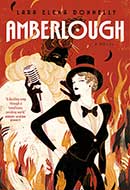 Do you have a friend or family member that simultaneously wants to escape our current world and resist what’s going on in it? Then give them Amberlough. As twinkling lights yield to the rising flames of a fascist revolution, a smuggler, a spy, and a dancer try to survive using any means necessary–including each other.
Do you have a friend or family member that simultaneously wants to escape our current world and resist what’s going on in it? Then give them Amberlough. As twinkling lights yield to the rising flames of a fascist revolution, a smuggler, a spy, and a dancer try to survive using any means necessary–including each other.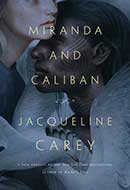 For the Shakespeare fan on your list, we have Miranda and Caliban, Jacqueline Carey’s beautiful retelling of The Tempest. We know the story of Prospero’s quest for revenge, but what about Miranda? What about Caliban, the so-called savage Prospero has chained to his will? Carey flips the coin on its head, showing us the rich inner lives of these neglected characters.
For the Shakespeare fan on your list, we have Miranda and Caliban, Jacqueline Carey’s beautiful retelling of The Tempest. We know the story of Prospero’s quest for revenge, but what about Miranda? What about Caliban, the so-called savage Prospero has chained to his will? Carey flips the coin on its head, showing us the rich inner lives of these neglected characters.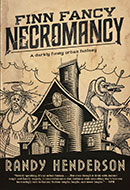 We all know someone totally obsessed with Stranger Things. Hell, we’re pretty obsessed with Stranger Things. Randy Henderson’s quirky, fun series is the perfect gift for them. Finn Gramaraye was exiled to the Other Realm for the crime of necromancy at the age of 15, in 1986. Now he’s served his time, and is back in the modern world trying to make his way–and to figure out how things changed since his beloved 80s.
We all know someone totally obsessed with Stranger Things. Hell, we’re pretty obsessed with Stranger Things. Randy Henderson’s quirky, fun series is the perfect gift for them. Finn Gramaraye was exiled to the Other Realm for the crime of necromancy at the age of 15, in 1986. Now he’s served his time, and is back in the modern world trying to make his way–and to figure out how things changed since his beloved 80s.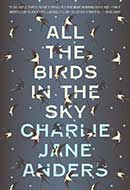 For the literary reader who’s ready for a walk on the weird side, we recommend the Nebula Award-winning All the Birds in the Sky. An ancient society of witches has gone to war with a hipster tech startup, and the result just might be the end of the world. As the battle between magic and science wages in San Francisco, childhood friends Patricia and Laurence must decide if they’re going to choose sides–or stand together and try to save the world.
For the literary reader who’s ready for a walk on the weird side, we recommend the Nebula Award-winning All the Birds in the Sky. An ancient society of witches has gone to war with a hipster tech startup, and the result just might be the end of the world. As the battle between magic and science wages in San Francisco, childhood friends Patricia and Laurence must decide if they’re going to choose sides–or stand together and try to save the world.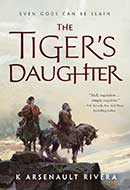 Are you looking for a gift for the feminist in your life? Look no further than the badass women in debut author K. Arsenault River’s The Tiger’s Daughter. Divine Warrior Empress O Shizuka and her best friend and partner, Qorin warrior Barsalayaa Shefali must defend the land from demons swarming from behind crumbling border walls. As the world falls apart, two goddesses arm themselves.
Are you looking for a gift for the feminist in your life? Look no further than the badass women in debut author K. Arsenault River’s The Tiger’s Daughter. Divine Warrior Empress O Shizuka and her best friend and partner, Qorin warrior Barsalayaa Shefali must defend the land from demons swarming from behind crumbling border walls. As the world falls apart, two goddesses arm themselves.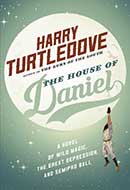 The master of alternative history returns with a tale that baseball fans and history fans alike will love. Set in an alternate Great Depression America full of wild magic, Harry Turtledove’s story of minor league baseball, zombies, and hotshot wizards will enchant you. The world–and baseball–will never be the same.
The master of alternative history returns with a tale that baseball fans and history fans alike will love. Set in an alternate Great Depression America full of wild magic, Harry Turtledove’s story of minor league baseball, zombies, and hotshot wizards will enchant you. The world–and baseball–will never be the same.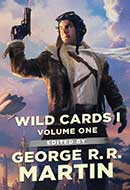 For the person eagerly awaiting the last season of Game of Thrones and the next book in A Song of Ice and Fire, we recommend Wild Cards I, edited by George R. R. Martin. An alien virus struck the Earth, and in the aftermath humanity is changed–some become Aces, with superhuman mental and physical abilities. Others become Jokers–cursed with bizarre abilities and physical deformities. A shared world, the Wild Cards series features stories from a wide variety of authors, from Roger Zelazny, Walter Jon Williams, Melinda Snodgrass, and of course, George R. R. Martin himself.
For the person eagerly awaiting the last season of Game of Thrones and the next book in A Song of Ice and Fire, we recommend Wild Cards I, edited by George R. R. Martin. An alien virus struck the Earth, and in the aftermath humanity is changed–some become Aces, with superhuman mental and physical abilities. Others become Jokers–cursed with bizarre abilities and physical deformities. A shared world, the Wild Cards series features stories from a wide variety of authors, from Roger Zelazny, Walter Jon Williams, Melinda Snodgrass, and of course, George R. R. Martin himself.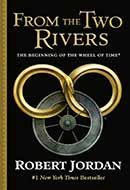 Trying to get someone on your list into epic fantasy? From the Two Rivers is the perfect entry point. This sleek new edition is perfect for fans of the Wheel of Time series as well as newbies to the series. And after you start reading the adventures of Rand and his friends, you won’t want to stop. Luckily, the series clocks in at 14 books, so there’s plenty of adventure ahead! Love the look of this new mini-edition? There are five more of them!
Trying to get someone on your list into epic fantasy? From the Two Rivers is the perfect entry point. This sleek new edition is perfect for fans of the Wheel of Time series as well as newbies to the series. And after you start reading the adventures of Rand and his friends, you won’t want to stop. Luckily, the series clocks in at 14 books, so there’s plenty of adventure ahead! Love the look of this new mini-edition? There are five more of them!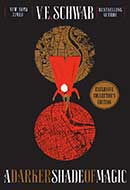 Know someone who loves magic? London? Portals to parallel worlds? Characters you can’t help but ship? Then V. E. Schwab is perfect for you! And this new collector’s edition of A Darker Shade of Magic is perfect for newbies to Schwab’s worlds, but even more perfect for her superfans, who will jump for joy at the sight of the new short stories and gorgeous fan art in this edition.
Know someone who loves magic? London? Portals to parallel worlds? Characters you can’t help but ship? Then V. E. Schwab is perfect for you! And this new collector’s edition of A Darker Shade of Magic is perfect for newbies to Schwab’s worlds, but even more perfect for her superfans, who will jump for joy at the sight of the new short stories and gorgeous fan art in this edition.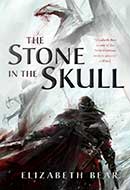 Know someone who loves the worldbuilding aspect of fantasy? Look no further than Elizabeth Bear. In The Stone in the Skull, Bear returns to the world she created in her Eternal Sky trilogy, expanding it to even greater breadth and scope. Even as she explores the new territory of the Lotus Kingdoms, a contested territory of warring states, she delves into the close-knit and complex relationships between her vividly realized characters, anchoring epic fantasy in humor and humanity.
Know someone who loves the worldbuilding aspect of fantasy? Look no further than Elizabeth Bear. In The Stone in the Skull, Bear returns to the world she created in her Eternal Sky trilogy, expanding it to even greater breadth and scope. Even as she explores the new territory of the Lotus Kingdoms, a contested territory of warring states, she delves into the close-knit and complex relationships between her vividly realized characters, anchoring epic fantasy in humor and humanity. 

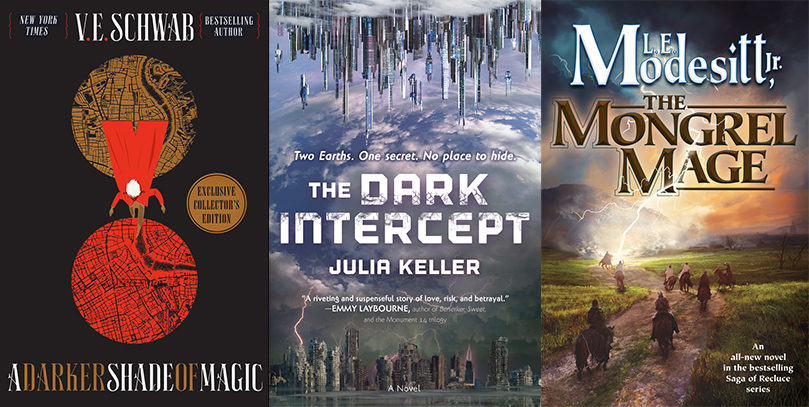

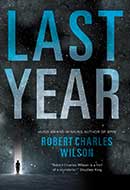
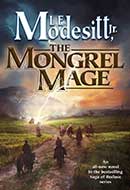
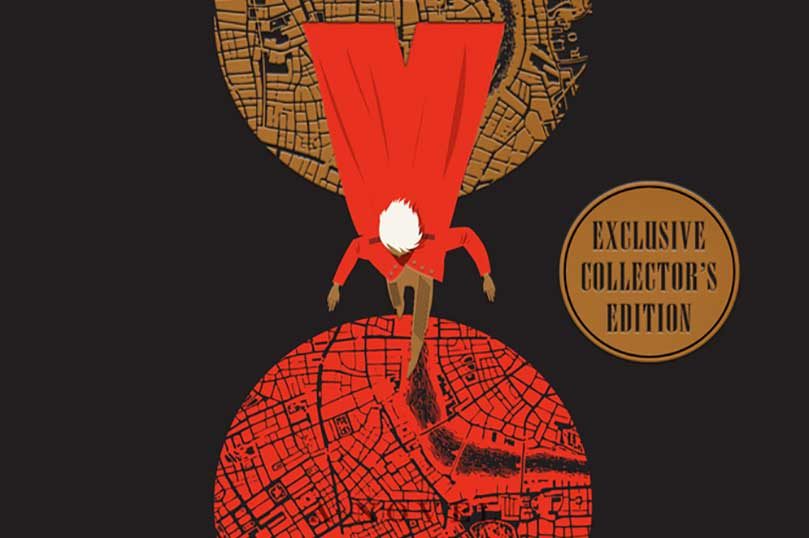
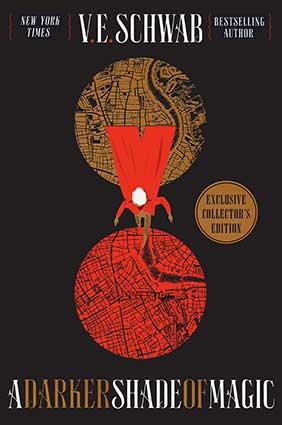
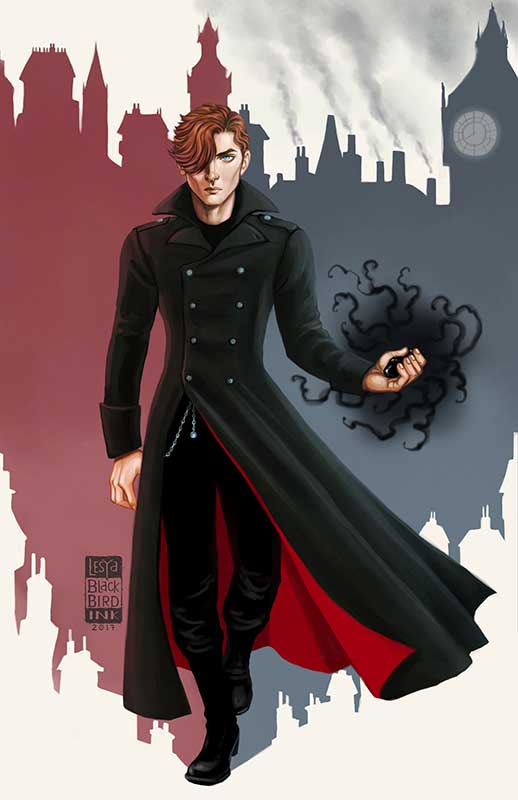
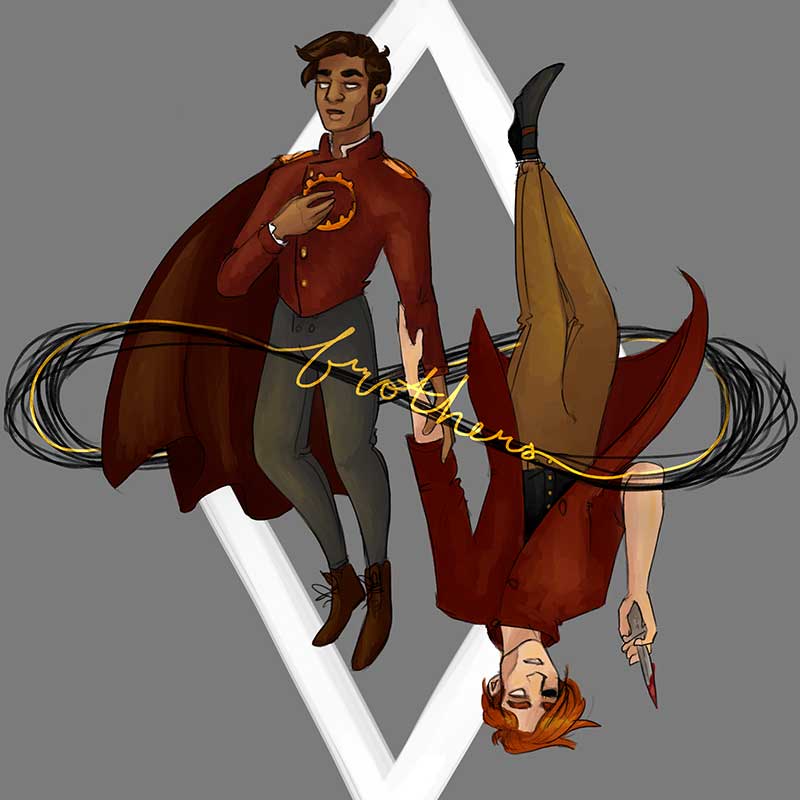






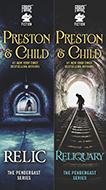
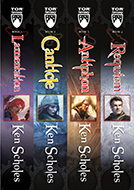 This discounted ebundle includes Lamentation, Canticle, Antiphon, and Requiem.
This discounted ebundle includes Lamentation, Canticle, Antiphon, and Requiem.